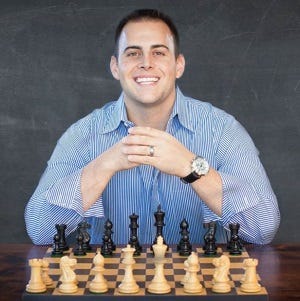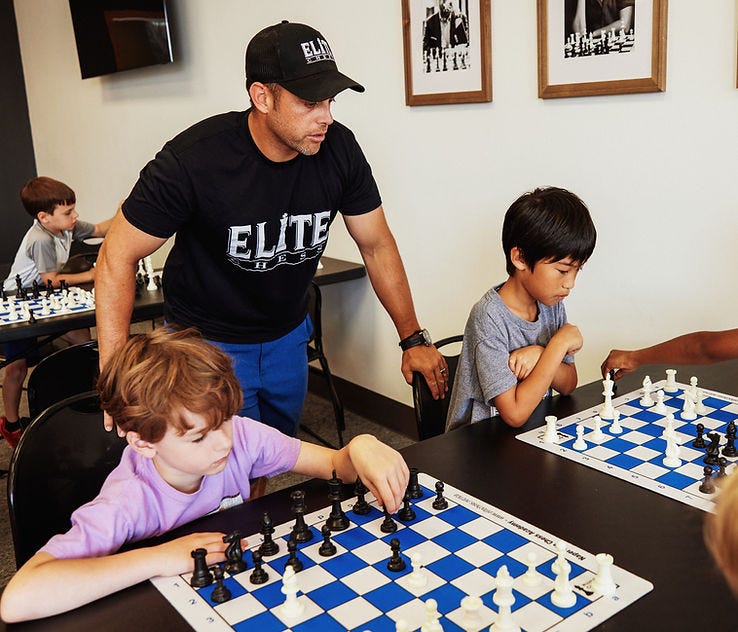$100,000/Year Teaching Chess
How this guy turned his passion for chess into a full-fledged business
🚀🚀 Want to reach 35,000 readers each month for just $66? More info here 🎯🎯
What is the business and who’s behind it?
Imagine earning $17 an hour teaching kids chess at a summer camp—and then turning that passion into a side hustle that now brings in over $100,000 annually.
That’s the journey Jeff DiOrio embarked on with EliteChess.
EliteChess is a chess education platform offering both in-person and online lessons for students of all ages. It’s run by Jeff DiOrio, a passionate chess coach who started teaching kids in summer camps for $17 an hour.
Jeff's transition into a full-fledged business was fueled by his deep love for teaching and his drive to create something that provided more value than what he was seeing in the market.
But what makes Jeff unique isn’t just his passion for chess—it’s his community-driven approach. He built his business by connecting with local charities and offering value before asking for anything in return. His organic growth strategy has led to his business flourishing without traditional marketing.
From humble beginnings to running a thriving online and in-person chess business, Jeff has managed to blend his love for the game with a sustainable business model that has kept growing even through the pandemic.
How was the business started?
It all began when Jeff was working at a summer camp, teaching chess to kids.
The idea for starting his own chess business started to take root, but Jeff was cautious. Instead of jumping right into creating a business under his own name, he decided to test the waters by hosting a charity chess tournament.
“I didn’t want to do it all under my name just in case it didn’t go well,” Jeff explained in this podcast.
He reached out to local charities, and one agreed to partner with him, promoting the tournament to their audience in exchange for all the proceeds.
The event was a success, validating Jeff’s belief that there was a demand for more chess opportunities in his area.
After the tournament, Jeff continued growing his presence by offering free coaching at local chess events. Slowly, he built a small but loyal following.
Eventually, this led to his first summer camp. “I made five times the amount of money teaching summer camps for somebody else with just 12 kids” Jeff said. That was his sign to go all in.
What was done to promote the business?
Jeff’s marketing strategy has been refreshingly organic.
He didn’t rely on ads or paid promotions in the beginning. Instead, he focused on building relationships.
By offering free coaching at tournaments and staying involved in the local chess scene, Jeff built a reputation.
He also created a simple email list of people who were interested in learning more, and he made it a point to nurture that list.
Word of mouth played a huge role in his success.
As Jeff started offering more value—like chess tournaments, individual assessments, and coaching seminars—people began talking about him, leading to more students. “We’ve never raised prices and lost people,” he mentioned, highlighting the loyalty his early supporters have shown.
How does the business make money?
Jeff’s initial pricing was modest—$8 an hour for group lessons, which was about the same as babysitting rates.
But as his business grew, so did his prices. Now, Jeff charges $25 an hour for in-person classes and $17 an hour for online lessons.
He’s learned that the key to successful pricing isn’t just about setting rates—it’s about offering value that justifies those rates.
As Jeff raised prices, he added more services to ensure that students felt they were getting more for their money. His pricing strategy has been about gradual increases with the aim of providing more value at each stage.
One of the keys to Jeff’s success is his shift to a monthly membership model. By offering a recurring payment option, he created a more stable revenue stream and kept students engaged for longer periods.
To minimize churn, Jeff uses several techniques—he builds habits by sticking to a strict schedule and constantly looks for ways to offer additional value.
He also shows students their progress with visual aids like progress charts and milestone rewards, which has helped keep his churn rate incredibly low for in-person classes.
Transitioning Online Due to the Pandemic
Like many businesses, Jeff was forced to pivot to online lessons during the pandemic.
What could have been a major setback turned into an unexpected opportunity. By halving his prices and offering online classes, Jeff not only retained his students but also saw his business grow exponentially. His student base skyrocketed from 90 to over 200 during the pandemic, as many students who couldn’t attend in-person sessions now had access to his online classes.
Jeff also made the transition easier by hiring additional coaches from around the world.
His business now employs coaches from countries like India and Bosnia, allowing him to scale quickly and offer diverse learning perspectives to his students.
Jeff never imagined that his side hustle would grow to the point of overtaking his day job. But today, EliteChess generates more income than his full-time job, and he’s seriously considering transitioning to full-time chess coaching.
He’s recently opened a physical location for his in-person classes and is expanding into YouTube to share free content with an even wider audience.
Through it all, Jeff has remained committed to giving back to the community. He regularly donates chess boards to schools and supports local fundraisers. It’s this focus on solving problems and helping others that has driven the organic growth of his business.
Where can we go to learn more about the business?
Get featured?
Let us know here what interesting business you’re running now and we will get in touch!









